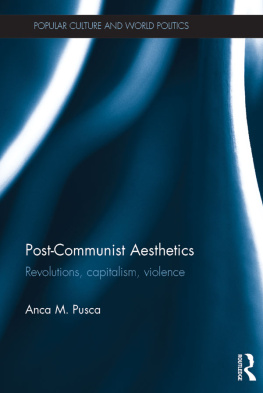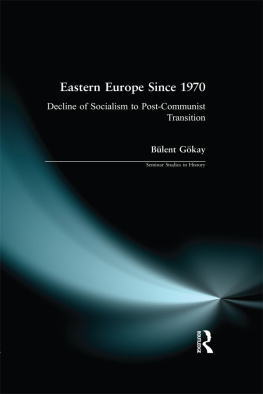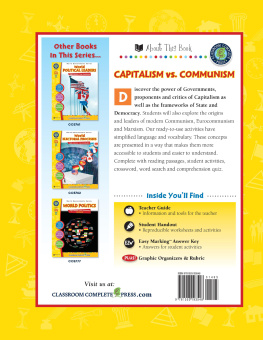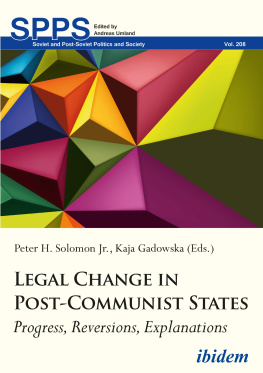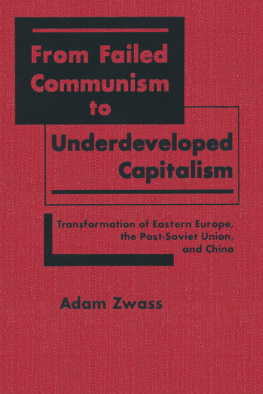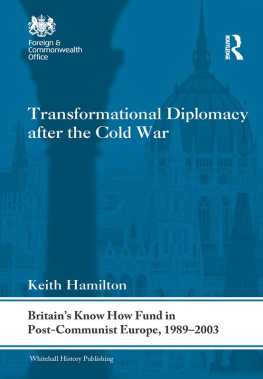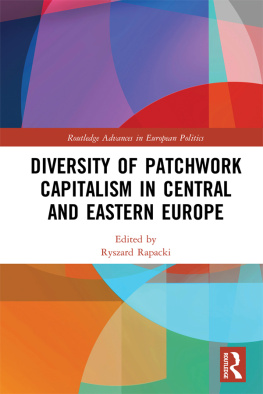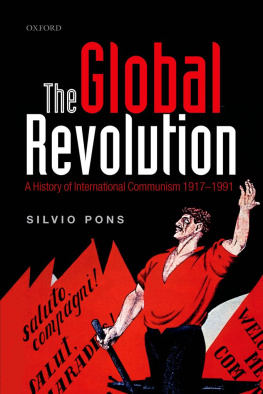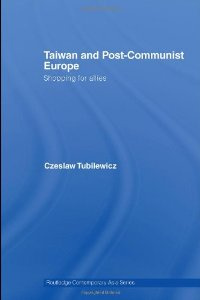Post-Communist Aesthetics
In this book, Anca Pusca seeks to extend the aesthetic and cultural turn in international relations to an analysis of post-communist transitions in Central and Eastern Europe. Building on the philosophy ofWalter Benjamin and Jacques Rancire, the work investigates how post-communist film, photography, theatre, art, museumisation and architecture have creatively re-engaged with ideas of revolution, communism, capitalism and ethnic violence, and how this in turn has helped people survive and reinvent themselves amongst the material and ideological ruins of communism. The work illustrates how popular culture has effectively targeted and re-interpreted the classical representations of the transition in order to question:
The origin focusing on practices of re-staging, memorialising and questioning the 1989 revolutions.
The unfolding focusing on the human and material consequences of significant changes in processes of production and consumption.
The potential end focusing on the illusions and disillusions surrounding the transition process.
A unique take on the influence that popular culture has had and continues to have on how we understand the post-communist transitions, this work will be of great interest to students and scholars of cultural and visual studies, Eastern European politics and international relations.
Anca M. Puscas current research seeks to re-conceptualise the aesthetics of change within the context of todays EU and its candidate states, by tracing spatial, architectural and visual representations and responses to the EUs most important policies: from immigration, monetary and the common agricultural policy to constitutional reform. She lectures at Goldsmiths, University of London.
Popular Culture and World Politics
Edited by Matt Davies, Newcastle University,
Kyle Grayson, Newcastle University,
Simon Philpott, Newcastle University,
Christina Rowley, University of Bristol and
Jutta Weldes, University of Bristol
The Popular Culture World Politics (PCWP) book series is the forum for leading interdisciplinary research that explores the profound and diverse interconnections between popular culture and world politics. It aims to bring further innovation, rigor, and recognition to this emerging sub-field of international relations.
To these ends, the PCWP series is interested in various themes, from the juxtaposition of cultural artefacts that are increasingly global in scope and regional, local and domestic forms of production, distribution, and consumption; to the confrontations between cultural life and global political, social, and economic forces; to the new or emergent forms of politics that result from the rescaling or internationalization of popular culture.
Similarly, the series provides a venue for work that explores the effects of new technologies and new media on established practices of representation and the making of political meaning. It encourages engagement with popular culture as a means for contesting powerful narratives of particular events and political settlements as well as explorations of the ways that popular culture informs mainstream political discourse. The series promotes investigation into how popular culture contributes to changing perceptions of time, space, scale, identity, and participation while establishing the outer limits of what is popularly understood as political or cultural.
In addition to film, television, literature, and art, the series actively encourages research into diverse artefacts including sound, music, food cultures, gaming, design, architecture, programming, leisure, sport, fandom, and celebrity. The series is fiercely pluralist in its approaches to the study of popular culture and world politics and is interested in the past, present, and future cultural dimensions of hegemony, resistance, and power.
Gender, Violence and Popular Culture
Telling stories
Laura J. Shepherd
Aesthetic Modernism and Masculinity in Fascist Italy
John Champagne
Genre, Gender and the Effects of Neoliberalism
The new millennium Hollywood rom com
Betty Kaklamanidou
Battlestar Galactica and International Relations
Edited by Iver B Neumann and Nicholas J Kiersey
The Politics of HBOs The Wire
Everything is connected
Edited by Shirin Deylami and Jonathan Havercroft
Documenting World Politics
A critical companion to IR and non-fiction film
Edited by Rens van Munster and Casper Sylvest
Sexing War/Policing Gender
Motherhood, myth and womens political violence
Linda Ahall
Popular Culture, Political Economy and the Death of Feminism
Why women are in refrigerators and other stories
Penny Griffin
Post-Communist Aesthetics
Revolutions, capitalism, violence
Anca M. Pusca
First published 2016
by Routledge
2 Park Square, Milton Park, Abingdon, Oxon OX14 4RN
and by Routledge
711 Third Avenue, New York, NY 10017
Routledge is an imprint of the Taylor & Francis Group, an informa business
2016 Anca M. Pusca
The right of Anca M. Pusca to be identified as author of this work has been asserted by her in accordance with sections 77 and 78 of the Copyright, Designs and Patents Act 1988.
All rights reserved. No part of this book may be reprinted or reproduced or utilised in any form or by any electronic, mechanical, or other means, now known or hereafter invented, including photocopying and recording, or in any information storage or retrieval system, without permission in writing from the publishers.
Trademark notice: Product or corporate names may be trademarks or registered trademarks, and are used only for identification and explanation without intent to infringe.
British Library Cataloguing in Publication Data
A catalogue record for this book is available from the British Library
Library of Congress Cataloging in Publication Data
Names: Pusca, Anca, author.
Title: Post communist aesthetics : revolutions, capitalism, violence / by Anca M. Pusca.
Description: Abingdon, Oxon ; New York, NY : Routledge
is an imprint of the Taylor & Francis Group, an Informa business, [2016] |
Series: Popular culture and world politics
Identifiers: LCCN 2015021635
Subjects: LCSH: Post-communism--Social aspects--Europe, Eastern. | Post-communism--Social aspects--Europe, Central. | Popular culture--Europe, Eastern. | Popular culture--Europe, Central. | Europe, Eastern--Social conditions--1989- | Europe, Central--Social conditions--1989-
Classification: LCC HN380.7.A8 P87 2016 | DDC 306.0947--dc23
LC record available at http://lccn.loc.gov/2015021635
ISBN: 978-0-415-52300-4 (hbk)
ISBN: 978-1-31566-828-4 (ebk)
Thinking about popular culture and world politics together is not new. We can read almost any important political thinker as having an acute interest in how they are related and how they shape and limit each other. Indeed, if we take each of those four terms as contestable, rather than fixed by definitional fiat, it is hard to think about them separately: whatever else popular might mean, it ultimately refers to a people and their agency; culture is notoriously plural and hard to pin down so it tends to describe spaces that cannot be reduced to particular identities; the world is increasingly taken as a unit of analysis (as in globalisation) but is difficult to specify in cultural or political terms; and politics, well, is there a more contested or contestable concept? Does it imply a people who might have a particular kind of agency or be governable? Is it shaped by whole ways of life or systems of producing and distributing meanings? Does it have a proper scale or space?

